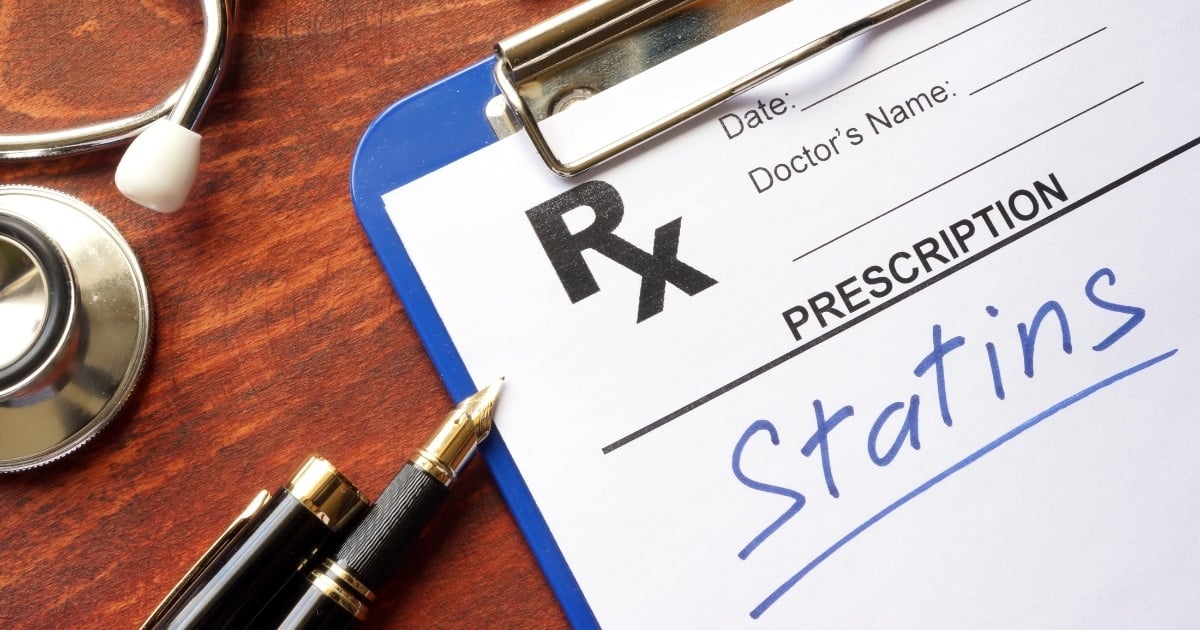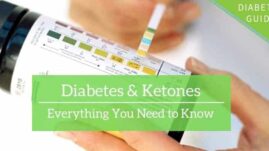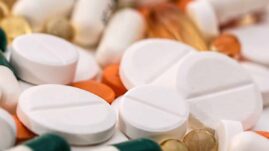Statins are prescribed to over 200 million people worldwide in an effort to prevent and lower their chances of experiencing cardiovascular events such as heart attack, stroke, and heart disease.
For people with diabetes, who have a higher risk of these heart-related conditions — they are twice as likely to have heart disease or stroke as those without diabetes — statins could be beneficial.
However, recent research suggests these drugs may actually worsen insulin resistance (a condition in which the body requires extra insulin to maintain normal glucose levels) and increase the likelihood of prediabetes developing into type 2 diabetes.
In this article, we’ll look at the proposed benefits of statins, the side effects, and the research comparing the benefits versus the risks, especially when it comes to insulin resistance.

Key facts
- Statins are a widely used class of cholesterol-lowering medications that are often prescribed to people with diabetes to lower their risk of various cardiovascular events.
- There is controversy among medical experts about whether the benefits of statins outweigh the potential risks, such as an increase in insulin resistance.
- You should speak with your doctor about the pros and cons of statins for your situation.
What are statins?
Statins are a type of drug designed to lower your LDL (also known as “bad”) cholesterol. They work by blocking an enzyme that the liver uses to produce cholesterol, causing it to take up more cholesterol from the blood. Medicines in this class include:
- atorvastatin
- cerivastatin
- fluvastatin
- lovastatin
- pitavastatin
- pravastatin
- rosuvastatin
- simvastatin
LDL cholesterol encourages the buildup of fat in the arteries (a condition also known as atherosclerosis), which increases your risk of heart attack and stroke because it narrows your arteries and impairs healthy blood flow, explains the American Heart Association.
For people with diabetes, the American Diabetes Association recommends an LDL goal of less than 70 mg/dL (3.9 mmol/L) or no greater than 55 mg/dL (3.0 mmol/L), depending on a person’s cardiovascular risk.
Your HDL (also known as “good”) cholesterol carries LDL cholesterol away from your arteries and to your liver where it is broken down and eventually excreted from your body. Your HDL cholesterol can eliminate about 25 to 33 percent of your LDL cholesterol.
Too little HDL cholesterol is dangerous to your heart health. For people with diabetes, the American Diabetes Association recommends an HDL goal of more than 60 mg/dL (2.60 mmol/L).
(In fact, your body needs both types of cholesterol in order to function.)
According to the Cleveland Clinic, statins also improve the function of the lining of your blood vessels, reduce inflammation, and repair existing cell damage from oxidative stress. They also prevent your blood from clumping together, which reduces your risk of a blood clot.
The American Heart Association (AHA) recommends statins for people who:
- Are 40 to 75 years old with LDL levels between 70 to 189 mg/dL
- Have a history of cardiovascular issues including heart attack, stroke, chest pain, peripheral artery disease, or transient ischemic attack
- Are 21 years or older with LDL levels of 190 mg/dL or higher
Should diabetics take statins?
There is a great deal of ongoing controversy over the safety and benefits of statins. Many in the medical world wholeheartedly support the use of statins, but just as many argue adamantly against them.
Let’s take a closer look at the side effects and research.
Side effects of statins
For some people, especially those with a “statin intolerance,” the side effects of this class of drugs can be unbearable. For others, the side effects are minimal.
Common statin side effects include:
- Constipation
- Nausea
- Indigestion
- Headache
- Muscle pain — especially in athletes
- Upper respiratory symptoms
- Liver function abnormalities
- Diabetes
- Fatigue and exhaustion
Who might have side effects from statin drugs?
Not everyone who takes a statin will have side effects, but some people are more likely to. According to the Mayo Clinic, factors that might make you more likely to have statin side effects include:
- Using several medicines to manage your cholesterol.
- Taking other medicines that don’t mix well with statins.
- Being a woman.
- Being smaller or older, especially if you’re over 80.
- Having problems with your kidneys or liver.
- Drinking a lot of alcohol.
- For some types of statins, drinking a lot of grapefruit juice.
- Having certain medical conditions, such as a thyroid that isn’t active enough or muscle diseases, like ALS.
Research: the benefits of taking statins
There have been many studies seeking to identify the benefits and risks of taking statins. As with many medications, studies can be found both supporting and discouraging the use of this class of medication.
Both the American Diabetes Association and the American Heart Association acknowledge the risks associated with taking statins but argue that the benefits outweigh the risks.
They also emphasize the theory that people who developed type 2 diabetes after starting statin therapy were already facing a high risk of the disease and likely would have developed it anyway.
One of the most significant studies demonstrating the benefits of statins is the Jupiter Trial, which involved 15,000 participants.
“The trial showed that compared to patients taking the placebo [inactive treatment], patients taking a statin had a 54 percent lower chance of heart attack, 48 percent lower chance of stroke, 46 percent lower chance of needing angioplasty or coronary artery bypass surgery, and a 20 percent lower chance of dying from any cause,” the Cleveland Clinic notes.
Another study, Prove IT-TIMI 22, looked at the benefits of statins in people who had already experienced an acute cardiovascular event, and whether lowering their LDL levels well below 70 mg/dL was more beneficial than lowering to just below 100 mg/dL.
The results showed that those in this group taking a statin had a significantly lower risk of death, heart attack, or stroke.
Research: the risks of taking statins
People with diabetes are frequently encouraged to start statin therapy because issues that are commonly linked with high blood sugar levels (such as obesity and high blood pressure) dramatically increase the risk of heart disease, heart attack, and stroke.
Insulin resistance: can statins cause diabetes?
People taking statins could see a significant increase in their risk of developing type 2 diabetes, according to research published in the journal Diabetes Metabolism Research and Reviews.
The increased risk of diabetes is the direct result of two factors: worsened insulin resistance and rising blood sugar levels.
“Other past research, with 150,000 female participants, revealed a 71 percent increased risk of diabetes,” said Dr. Alexander Reeves, MD, a neurologist and former professor of neurology at Dartmouth Medical School who speaks around the world about the dangers of statin therapy.
Reeves is adamant that the risks of taking statins do not outweigh the benefits.
He also pointed to five major studies on statins that, when combined, essentially determined only one death from a heart attack or stroke would be prevented if 129 patients were treated with statins for 640 years, undermining the entire argument that reducing high LDL cholesterol levels reduces a person’s risk of a heart attack.
“This recent study from Ohio State also took for granted that lowering cholesterol with statins was considered a major benefit based on the flawed use of the ‘relative-risk’ reduction,” he added.
“Knowing the real stats makes it ludicrous to prescribe statins,” said Dr. Reeves, “and the increased incidence of diabetes is only one of many deleterious effects of this drug.”
Congestive heart failure
Some research demonstrates that simply reducing cholesterol levels not only has little impact on a person’s risk of a heart attack but also severely increases their risk of other health issues, including congestive heart failure.
“Congestive heart failure (CHF) is now the most common cause of hospitalization in the 65 and older population,” said Dr. Reeves. “The prevalence of CHF increased 230 percent between 1980 and 2006, during which time statin use also grew almost exponentially, in the absence of any other major significant potential etiology, with the exception of type 2 diabetes, which was also increasing at an epidemic rate.”
The CHF “epidemic,” suggested Dr. Reeves, parallels the rising use of statins, which are now estimated to be used by one-quarter to one-third of all adults over 45 years old.
Depleting CoQ10 — linked to Parkinson’s, diabetes, heart issues
Other identified consequences of taking statins include effects on your body’s “ubiquinol,” or CoQ10, levels. This coenzyme is a critical part of any human or animal’s well-being, and statins have been shown to drop CoQ10 levels in the body by as much as 50 percent, explained Dr. Reeves.
Present in every cell of your body, CoQ10 is necessary for the maintenance and production of energy. It’s found in concentrated amounts in the tissue of your heart, brain, kidneys, and muscles. It’s also a powerful antioxidant and fights off free radicals that would otherwise damage your cells and DNA.
Low levels of CoQ10 have been linked to diabetes, Parkinson’s, and heart problems. Experts who are critical of statins suggest that in individuals who started taking the medication before any of these conditions appeared, the drug might have played a role in causing those issues to develop.
A 2015 study from Japan suggests that not only do statins have little or no impact on preventing atherosclerosis, but that this class of drugs may also actually cause the buildup and hardening of fats, cholesterol, and plaque in your arteries — increasing your risk of a heart attack or stroke.
“The epidemic of heart failure and atherosclerosis that plagues the modern world may paradoxically be aggravated by the pervasive use of statin drugs,” explained the study.
“In my own — and many of my colleagues’ — experience with patients, very few statin users are also taking ubiquinol or ubiquinone, two different forms of supplemental CoQ10,” said Dr. Reeves. “And they clearly should be.”
Muscle pain
Another common issue statin users face is muscle pain — something supplemental CoQ10 has the potential to help alleviate.
“A significant percentage of heavy-duty endurance and resistance-trained athletes taking statins develop muscle pain, and not surprisingly, quickly stop taking the drug,” said Dr. Reeves, referring to a variety of research studies on the topic of statin use in those who exercise.
In contrast, people who are not active are less likely to show symptoms of muscle pain.
Depression and anxiety
Statins have also been associated with depression and anxiety because of the drug’s impact on serotonin levels.
Dr. Reeves, drawing on his expertise as a neurologist, pointed out that low cholesterol levels have been linked to an increased incidence of suicide, irritability, and aggression, emphasizing cholesterol’s vital role in interneuronal communication — which is how neurons in your brain communicate with each other.
Why your body needs cholesterol
In addition to lowering LDL cholesterol, statins also significantly decrease the concentration of “good” HDL cholesterol, which plays a critical role in transporting “maintenance cholesterol” throughout the entire body where it replenishes necessary stores in tissue, cell walls, and membranes.
This distribution of cholesterol also plays a vital role in hormone and enzyme production, explained Dr. Reeves, and in reducing and managing acute and chronic inflammation.
“Your liver produces cholesterol because every cell wall in your body depends on it,” said Reeves. “Without cholesterol, you melt. You die. Cholesterol is anti-inflammatory. When you have inflammation in your body, cholesterol levels go up to help manage that inflammation.”
This means that a person with other health concerns or unhealthy habits may show high cholesterol levels in their routine lab work and be treated for high cholesterol rather than being treated properly for those other issues.
Consequently, lowering cholesterol with statins could potentially worsen the patient’s overall inflammation, which in turn could aggravate health issues like insulin resistance and high blood sugar levels.
When you consume enough cholesterol, your body actually backs off on its own production.
“And finally,” adds Reeves, “it’s not a surprise that it has now been observed that the elderly with the highest cholesterol levels — HDL and LDL — have the greatest longevity.”
Should you stop taking statins?
Unfortunately, determining whether or not you should continue taking statin drugs is tricky. Depending on who you ask, you’re apt to get a very different answer.
Most likely, mainstream cardiologists and endocrinologists will encourage you to take statins.
If you speak to a more progressive medical professional, you may find encouragement to stop taking statins while focusing on improving your HDL cholesterol naturally and letting it improve your LDL.
Either way, it is important to speak with a healthcare provider so they can perform a risk-benefit analysis for your situation and recommend what they think is the best course of action for you.
Instead of statins
Whether or not you continue taking statins, you’ll want to focus on improving your HDL, blood sugar levels, and insulin sensitivity.
Natural ways to increase your HDL, according to Dr. Reeves, include:
- Getting regular exercise
- Quitting smoking
- Following a Mediterranean-like diet (an eating style that emphasizes vegetables, fruits, legumes, nuts, grains, unrefined cereals, olive oil, garlic, poultry, and fish)
- Eating mostly whole foods (especially vegetables!)
- Decreasing processed foods
- Getting omega-3 fatty acids from seafood or a supplement
- Eating cholesterol from fresh, organic, cage-free eggs
- Drinking the occasional glass of red wine
- Reducing heavy alcohol consumption




